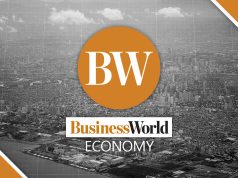Regulation of shipping charges could hurt competitiveness
THE government’s plan to regulate the fees charged by international shipping lines that operate in the Philippines will likely disrupt the trade and negatively affect the country’s competitiveness, according to a study conducted by a University of the Philippines professor.
In a presentation of his “Study on International Shipping in the Philippines” in Manila Wednesday, Epictetus E. Patalinghug, a professor emeritus at the University of the Philippines-Virata School of Business, said the proposed Joint Administrative Order (JAO) that seeks to regulate the fees and charges of international shipping lines that operate in the country “will likely disrupt the trade and affect the competitiveness of the Philippines.”
Mr. Patalinghug noted at the Wallace Business Forum at the Sofitel Hotel that the JAO drafted by Department of Finance (DoF), Department of Trade and Industry (DTI), and Department of Transportation (DoTr) has not been yet been finalized.
The DTI said in a statement earlier this year that the purpose of the order is “to address the reported concerns of the business sector regarding the prevalent high shipping charges and port congestion.”
Mr. Patalinghug’s study found that “there is no collusion in the industry and that the imposition of shipping fees and charges is following internationally acceptable standards.”
The study said the “intense” competition in the international shipping industry has resulted in the oversupply of vessels, leading some shipping companies to “impose origin and destination surcharges on top of freight rates to recover their losses.”
He recommended that shipping companies “may voluntarily post in their websites all-in freight charges, unbundling the basic freight rate from the itemized surcharges;” and JAO, in the short run, “may refocus its thrust… to drafting monitoring rules and guidelines specifying the criteria and procedures to be followed by carriers when they impose surcharges.”
Mr. Patalinghug’s study also noted that the long-term goal of government policy is to “build regulatory capacity in a single agency tasked to promulgate rules and regulations on surcharges that can be imposed by international shipping lines’ service providers.”
He noted that international shipping contributes to increased Philippine trade in the ASEAN region, as well as with China, Japan, South Korea, India, Hong Kong, Taiwan, Germany, and the United States.
“The volume and value of imports and exports grew at an average annual rate above 5% for the 2010-2018 period,” Mr. Patalinghug said during his presentation.
He said port efficiency should also be improved, noting that port infrastructure accounts for more than 40% of transport costs.
“Inefficient ports have higher handling costs,” he said.
He also argued that private entities “should handle the commercial side of terminal operations and management” while the government should focus on “policy-making, regulating environment, safety, and content regulations.”
He said the JAO wants freight rates to include all surcharges and other fees. Citing the World Shipping Council’s position, he said: “Surcharges are really separated by shipping lines from base freight rates to specifically address and recover distinct and identifiable costs separate from basic transport service.”
Mr. Patalinghug also noted that the Association of International Shipping Lines, Inc. has questioned the legal authority of the Bureau of Customs to regulate the imposition of surcharges. He told reporters during an interview that JAO, if pursued, “may face legal issues.” — Arjay L. Balinbin



